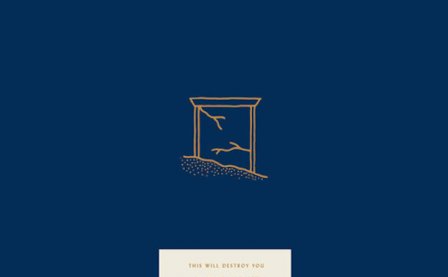This Will Destroy You are aural absolutists; “5” doesn’t exist on their sonic or emotional spectrum. They leave idling in the mids or crawling up a crescendo to their contemporaries. In a discography spanning nearly a decade, TWDY only spend time in the meadow or the maelstrom. There’s nowhere else they’d rather be live, either.
I waited seven years since first hearing Young Mountain as a freshman DJ in college to find out how this band would translate the storms they pinned down in a studio into a show. Playing at Lincoln Hall, my favorite Chicago venue, was already auspicious; the room’s acoustics are on point and its sound system is an avalanche on the audience. With the release of Another Language and the newly self-applied tag of “Doomgaze,” TWDY left the twinkle and uplift the hand-holders of the post-rock fandom are so keen on for more umbrous territory. Their new material is crushing, and they don’t let their audience up from the onslaught.
The band also notably fine-tuned their approach to structure. One of my favorite tracks on the new record, “Invitation,” spends six minutes expanding and contracting around a central drum tattoo as guitars burst and wither. I remember TWDY rarely pausing in their hour-and-a-half set, spanning four albums’ worth of material in a comprehensive set. This Will Destroy You is still a young gun in comparison to some of their peers, but I can’t think of any other band living up to their name so well.
P.S. Donovan Jones (bass) and Chris King (guitar) were super-duper nice dudes and kindly obliged me for an impromptu interview:
How long have you guys been on the road for?
Donovan Jones: This is our… fourth show?
Chris King: Yeah, fourth show.
Did you start the tour from Texas?
DJ: Yeah, we just finished a European tour before that, and we had a two-week break. It feels like the tour kind of just extended over.
Actually you’re one of the only bands I know of who has a live album recorded in Europe, in Reykjavik. What made you guys decide on Iceland?
CK: It was completely random. We played in this amazing place that was called Harpa Music Hall, and we found out afterward the sound guy multi-track-recorded the show. We heard snippets of it, and it sounded, like, pristine. It almost sounded like a studio record because people were so quiet during the show, and the acoustics in there. It sounded so good we were just like “Shit, let’s put out a live record.”
Did you find a European audience was more receptive to… I’m loath to use the term, but post rock?
DJ: Yeah, definitely. They’re just more used to instrumental music historically, whereas Americans can have kind of a low attention span where they’re waiting like a minute-and-a-half for a chorus. If it doesn’t come, they tend to just move onto the next station or the next track.
Did any of your experiences in the last tour cycle contribute to what you brought into recording for Another Language?
CK: Yeah. I feel like the transition from Tunnel Blanket to the newer record was definitely a collective consciousness of us being on the road for so long. Just learning things about life in general, figuring it out…
DJ: Yeah.
CK: …And translating it.
DJ: Yeah I mean things were really dark for awhile. Some of the tours were pretty fucking dark. You know, moments pass and you get some sort of… perspective [on] it. I think that helped with writing the new album.
There’s a lot of dynamics in the album, from tranquil moments to enormous bursts. Did that reflect with what you guys were experiencing on the tour, in life in general?
DJ: Sure, yeah sure in some way. I don’t think it was that preconceived or pre-meditated.
CK:I think it was more of a subconscious thing. I feel like we’ve always written that way, where it’s kind of more of a feeling than a restraint or trying to fit into something. [Writing] is just feeling it out.
What’s your guys’ process in constructing a song?
CK: It really varies.
DJ: It does vary. We can start with a loop, or we can… With this album, we did a lot of writing together as a band, which was something we didn’t really do that much with Tunnel Blanket. Tunnel Blanket was tracked, each instrument, not in a live setting, at least when we were writing it. When we went into the studio with [John] Congleton [producer], it was all of us together.
Did you notice a marked in writing Another Language, being closer together, more cohesive as a unit?
DJ: I think in some ways, definitely. We had to figure out how to pull things off in real time as we were recording them.
CK: I think for some of us, it was growing musically too; having more melodic elements, figuring out formulas, things that work and don’t work. It was a process, but we feel good about it.
Yeah the album’s fantastic, thank you guys for ducking into this alley with me to talk while Santana’s blaring from that restaurant across the street.
DJ and CK: [Laugh] Thank you.
More about: Future Land Time Machine, Silent Death, This Will Destroy You



